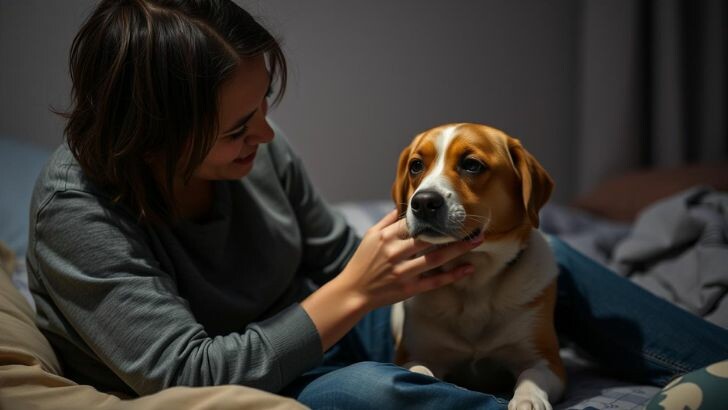Why Is My Dog Coughing at Night? Complete Guide for Pet Owners
Hosted by amdestino
Tweet ShareWhy Is My Dog Coughing at Night? Complete Guide for Pet Owners
If your dog keeps coughing at night, it’s natural to feel worried. Nighttime coughing not only interrupts your pet’s sleep but also raises concerns about possible health issues. While an occasional cough may not be alarming, frequent or persistent episodes should not be ignored. This guide explains the common reasons dogs cough at night, how to identify serious symptoms, and what you can do to help.
See more: https://petpettypaw.com/dog-coughing-at-night/
1. Understanding nighttime coughing in dogs
Coughing is the body’s natural reflex to clear the airways from irritants, mucus, or foreign objects. Just like humans, dogs cough for many reasons. However, when it happens repeatedly during the night, it often points to an underlying health problem. The quiet nighttime environment, lower temperatures, and the dog’s lying position can all make coughing episodes worse after dark.

2. Common reasons your dog coughs at night
2.1. Respiratory diseases
Respiratory illnesses such as pneumonia, bronchitis, or tracheal infections are leading causes of dog coughing at night. Dogs may produce a dry hacking cough or a wet, phlegmy one depending on the infection. These conditions often require veterinary care to prevent complications.
2.2. Heart conditions
Coughing at night is a classic symptom of heart disease in dogs. When the heart is weak, fluid builds up in the lungs, making breathing harder, especially when lying down. If your dog’s cough is persistent and paired with fatigue or fainting, a heart checkup is essential.
2.3. Parasitic infections
Heartworms and lungworms are dangerous parasites that damage the lungs and blood vessels. Dogs infected with these parasites often develop chronic nighttime coughing, fatigue, and weight loss. Without prevention and treatment, heartworm disease can become fatal.
2.4. Kennel cough
Kennel cough is highly contagious and spreads quickly among dogs in close quarters. The hallmark sign is a harsh, honking cough that intensifies at night. While it may resolve in healthy adults, puppies and senior dogs can suffer serious complications if untreated.
2.5. Allergies and asthma-like symptoms
Dogs are sensitive to dust, smoke, mold, and pollen. These irritants can inflame the airways and trigger coughing fits, especially in poorly ventilated indoor spaces at night. In some cases, the symptoms resemble asthma with wheezing and shortness of breath.
2.6. Foreign objects or airway blockage
A sudden onset of severe coughing can indicate something stuck in your dog’s throat, such as a toy fragment, seed, or small bone. This situation is an emergency and needs immediate veterinary intervention.
3. How to recognize when nighttime coughing is dangerous
Not all nighttime coughs are emergencies, but it’s important to watch for red flags. Take your dog to the vet right away if you notice:
-
Coughing lasting more than two weeks.
-
Difficulty breathing, wheezing, or gasping.
-
Coughing up blood, mucus, or frothy liquid.
-
Loss of appetite, lethargy, or weight loss.
-
Swollen belly or legs, which can signal heart problems.
Ignoring these warning signs may put your dog at risk of serious complications.
4. Veterinary diagnosis of nighttime coughing
When you bring your pet to the vet, they may recommend:
-
Physical examination to listen to the lungs and heart.
-
Bloodwork to detect infections or parasites.
-
Chest X-rays to evaluate the lungs and heart size.
-
Ultrasound to check for heart abnormalities.
-
Endoscopy to identify airway obstructions or inflammation.
Accurate diagnosis is crucial because treatment differs depending on the cause.
5. Treatment options for dogs coughing at night
5.1. Medical treatments
Based on the diagnosis, your vet might prescribe:
-
Antibiotics for bacterial infections.
-
Anti-parasitic medication for heartworm or lungworm.
-
Cough suppressants or bronchodilators to ease breathing.
-
Heart medication for dogs with cardiovascular issues.
5.2. At-home care and management
You can help your dog recover and reduce coughing episodes by:
-
Keeping the sleeping area clean, warm, and dust-free.
-
Using a humidifier if the air is dry.
-
Avoiding exposure to cigarette smoke, candles, or aerosols.
-
Ensuring proper nutrition to strengthen the immune system.
5.3. Preventive measures
The best way to avoid dog coughing at night is prevention:
-
Keep up with vaccinations (especially kennel cough and respiratory illnesses).
-
Provide monthly heartworm prevention medication.
-
Schedule annual vet checkups for early disease detection.
-
Minimize your dog’s exposure to allergens.

6. When to seek urgent veterinary care
You should not wait until morning if your dog:
-
Has nonstop coughing with gagging or retching.
-
Shows severe breathing distress or collapses.
-
Produces bloody coughs.
-
Appears extremely weak or unresponsive.
In these cases, immediate emergency care could save your dog’s life.
7. Tips for improving nighttime comfort
Even if the cause of coughing is mild, making your dog more comfortable can reduce symptoms:
-
Elevate your dog’s head slightly with bedding to ease breathing.
-
Ensure proper hydration throughout the day.
-
Limit strenuous exercise if your vet suspects heart or lung issues.
-
Keep your home environment calm and stress-free.
8. Final thoughts
Dog coughing at night should never be overlooked. Occasional coughing might be harmless, but persistent or severe episodes, especially dog dry coughing at night, are often associated with respiratory infections, heart disease, or even parasites. As a responsible pet owner, paying close attention to your dog’s symptoms, consulting a veterinarian promptly, and practicing preventive care are essential steps to ensure your furry companion stays healthy and comfortable.
By acting early and supporting your dog with the right treatments and a comfortable environment, you can ensure restful nights and a better quality of life for your furry friend.